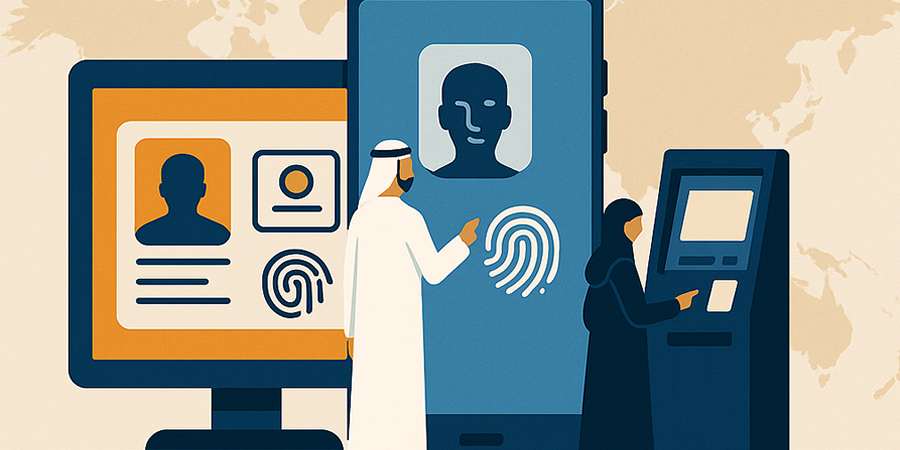In recent years, Middle Eastern governments have embarked on ambitious digital transformation journeys to enhance efficiency, transparency, and citizen satisfaction.
Traditionally, government services in the Middle East were characterized by bureaucratic processes and in-person interactions. Recognizing the need for modernization, Arab countries have introduced comprehensive digital strategies.
Various initiatives now focus on leveraging technology to provide seamless, accessible, and efficient services to citizens and residents alike.
The 2024 United Nations E-Government Survey highlighted steady global progress, with Saudi Arabia, the UAE, and Bahrain earning top E-Government Development Index (EGDI) ratings. This reflects the Gulf Cooperation Council’s (GCC) strong digital transformation, driven by strategic investments, economic diversification, and regional cooperation.
United Arab Emirates (UAE)
The UAE is advancing its digital identity system by introducing a facial recognition-based platform that will eliminate the need for physical Emirates ID cards when accessing key services. This initiative is part of a broader push to streamline public service access through tools like the UAE PASS and UAEICP apps, which serve as unified digital identities for electronic document signing and service management.
In a similar context, the Telecommunications and Digital Government Regulatory Authority (TDRA) plays a key role in enhancing government efficiency through digital enablers. The TDRA’s Digital Awareness Officer, Roudah Al Falasi, highlighted the authority’s efforts to drive digital transformation.
Notably, the Dubai Centre for Artificial Intelligence (DCAI) has been established to train over 1,000 employees from more than 30 entities on generative AI (GenAI) and support the adoption of future technologies in government operations.
Saudi Arabia
In 2023, Saudi Arabia topped the UN ESCWA’s (United Nations Economic and Social Commission for Western Asia) Government Electronic and Mobile Services (GEMS) Maturity Index, showcasing leadership in digital public services. A testimony to this success is the Ministry of Interior’s Absher platform, which issued over 28 million digital IDs by 2024. These IDs facilitate secure access to a wide range of services via Absher or the national portal, Nafath, which offers single sign-on access to more than 530 government and private services. Nafath has already processed over 3 billion verification operations, simplifying service delivery and boosting user experience (UX).
To further boost digital infrastructure, Saudi Arabia’s Zakat, Tax and Customs Authority (ZATCA) launched the FATOORA platform to digitize invoicing, making processes more transparent and efficient. The Kingdom also plans to invest USD 40 billion in artificial intelligence to drive innovation and become a global tech leader.
Qatar
In early 2025, as part of its National Digital Authentication and Trust Services Strategy (2024–2026), Qatar unveiled a unified digital ID system that will build a secure, integrated digital framework to enhance trust in electronic transactions while protecting personal data. The unified digital ID will streamline user access to a wide range of services, eliminating the need for multiple identities.
The strategy also includes developing regulatory frameworks for digital signatures, seals, and timestamping, with implementation planned in two phases. It emphasizes collaboration across government entities, individuals, and the private sector to ensure seamless digital integration.
In support of this vision, Qatar signed a five-year partnership with Scale AI to embed artificial intelligence into government services, targeting improved efficiency through predictive analytics and automation. Complementing this is the Ministry of Communications and Information Technology’s (MCIT) Digital Factory initiative, which promotes the adoption of cutting-edge technologies like AI and blockchain to modernize public service delivery.
Oman
Oman’s Government Digital Transformation Program, part of the National Program for the Digital Economy, is driving the shift toward a digitally enabled government guided by strong governance and emerging technologies. The initiative focuses on digitizing public services, enhancing digital infrastructure, and building national capacity for sustainable digital transformation.
In April 2025, signifying a key step toward promoting digital inclusion, the Ministry of Transport, Communications, and Information Technology (MTCIT), through its Tahawul program, launched the Digital Accessibility Guideline. This initiative is designed to ensure that all members of society, including people with disabilities and the elderly, can easily access and benefit from digital government services. The guideline supports the broader goals of Oman Vision 2040, which emphasizes service quality, inclusivity, and universal access to government offerings in the digital era.
A Vision for the Future of Digital Governance in the Middle East
The Middle East, particularly GCC countries, is on a transformative journey toward digital governance. Recent statistics underscore this momentum: GCC nations have achieved a net satisfaction score of 81% in digital government services while citizens in the region utilize these services 22% more frequently than their global counterparts.
Notably, 76% of GCC citizens have embraced AI-powered government services, and there's a remarkable 71% net trust in governmental use of AI, highlighting a strong foundation of public trust and readiness for AI-driven innovations.
To maintain and accelerate this trajectory of digital government advancements, continuous investment in digital infrastructure, data governance, and AI capabilities is needed.
The fusion of visionary leadership, technological innovation, and public engagement will shape a resilient and responsive digital future for the Middle East region.
Also Read:
Innovation in Action: Oman's Bold Steps in Digital Government Transformation
Next-Gen Government: How Generative AI is Changing the Citizen Experience
